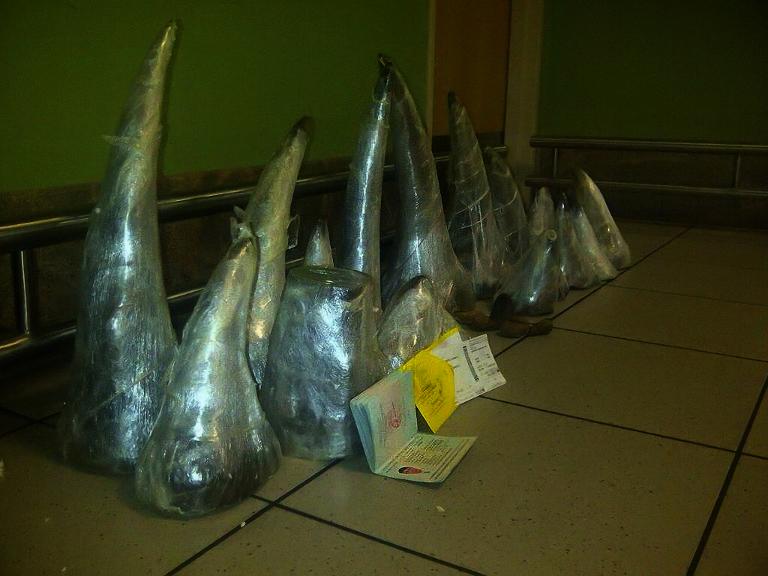Two Vietnamese men were arrested at Johannesburg airport with a record haul of 18 rhino horns, weighing 41 kilograms during a stopover on a flight from Mozambique to Vietnam, AFP quoted South African police as reporting on Saturday.
According to a joint statement from police and customs officials, the Saturday cache is the largest haul of rhino horns seized in one operation in South Africa.
The flight had started in Maputo, Mozambique, and was heading to Hanoi.
AFP quoted the police as saying that the horns, which were still intact, were believed to have been removed from South African rhinos.
The two Vietnamese men, aged 25 and 26, were in police custody after being stopped late Friday. They were due to appear in court on Monday.
The Qatar Airways flight had been due to make a one-hour stop at OR Tambo airport but a “very credible” tip-off led authorities to request that passengers leave the plane so they could investigate, AFP quoted lieutenant general Solomon Makgale, a police spokesman, as recounting.
In related news, customs officers at Hanoi’s Noi Bai International Airport on the same day (Saturday) afternoon seized three Vietnamese passengers who had seven kilograms of rhino horns on them on a flight from Bangkok.
The passengers, Vuong Minh Thu, 24, Duong Thi Thuy Hien, 35 and Bui Thi Xien, 48, boarded the QR 828 flight from Bangkok to Hanoi.
Also on October 27, officers at Noi Bai Airport seized Nguyen Thi Ngoc Nu, who hid almost 6 kilograms of rhino horn in her hand luggage, on a flight from Bangkok to Hanoi.
According to statistics released by South Africa’s Endangered Wildlife Trust, the total number of rhinos worldwide has plummeted by an alarming 95 percent over the past 40 years.
Only some 25,000 individuals are left in the wild.
South Africa is home to 80 percent of the world’s rhino population.
About 1,000 were killed in the African country last year, while 933 rhinos have already been slaughtered this year.
Only 13 were killed in 2007, before consumer demand for horns began to explode in Asia, including Vietnam.
Conservationists warned that if nothing is done to stop the rapidly deteriorating situation, every rhino breed will become extinct in the next six years.
Vietnam is considered a major hub of the illegal rhino horn trade, with demand rising rapidly over the past decade.
The horns, which are made from keratin, the same material in hair and nails, are generally crushed into powder and used by opulent Vietnamese as a ‘potion,’ since it supposedly has miraculous medicinal properties. For example, some claim they can cure cancer, or act as an after-party “hangover cure.” Horns are also popular as costly gifts in business deals.
Three famed Vietnamese pop singers were invited to South Africa earlier this year to help raise awareness of the issue.
Vietnam has also launched several campaigns to convey the shocking reality to the local public and spur them into action to help protect the world’s rhinos, first by not buying the animal’s horns.























































